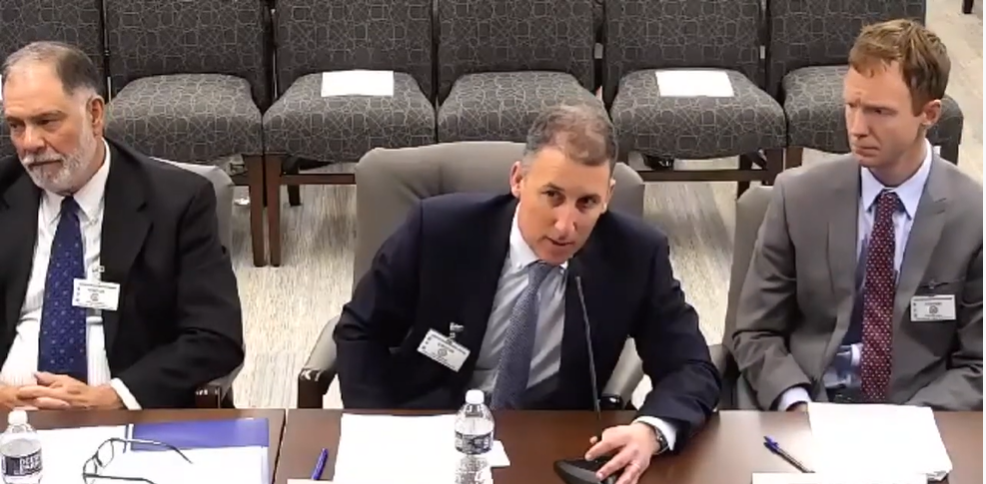On the morning of April 27, ISRI member Ben Abrams, president and CEO of Consolidated Scrap Resources (CSR), testified before the Surface Transportation Board on behalf of ISRI and the recycling industry on several rail service problems. The two-day public hearing included testimony from carriers, rail customers, labor organizations, and other interested parties.
Abrams thanked the Board for holding the hearing and giving shippers the opportunity to discuss concerns with rail service and how it impacts shippers of recycled ferrous materials. “Ferrous is an essential raw material used for more than 70% of U.S. steel production,” Abrams explained to the Board. “U.S. steel mills consume more than 60 million tons of recycled ferrous per year, and according to the AAR [The Association of American Railroads], more than 40 million tons of that amount travels via rail.”
Rail transportation is critical to move recycled ferrous to steel mill customers especially at distances greater than 150 miles between recycling facilities and steel mills. “The steel industry has shifted more of its mill locations demographically to the southeast U.S.,” notes Billy Johnson, ISRI’s chief lobbyist. “However, our members are located all over the country, and they need to get their materials to these mills. Since 70% of steel is made from recycled content, that ferrous material is essential to making steel, not just for the recently passed Infrastructure Investment and Jobs Act package but also as steel for cars, refrigerators, and practically everything else in the supply chain.”
The lack of adequate car supply materially affects shippers’ ability to satisfy shipment volumes and delivery needs of the steel mills. Abrams noted that recyclers often need to invest in their own private railcars at significant expense to get more reliable and consistent rail capacity. He added the problems arose after the U.S. Class I railroads implemented Precision Scheduled Railroading (PSR) in 2017 as their operating model. While PSR was intended to improve rail service, the accompanying expansive cost-cutting in labor and equipment assets did not improve service efficiencies and reliability.
Abrams pointed to a recent ISRI member survey on service provided during the last 90 days. Respondents overall gave rail service poor ratings. On a scale of 1-5 with 1 being the worst and 5 being exceptional, the average rail service rating was 2. No member rated their rail service higher than a 3.
“The survey respondents expressed concern that poor rail service is preventing them from meeting the delivery requirements of their steel mill customers and leads to substantially higher costs for replacing trucking and the need to lease or buy additional railcars, as well as lost sales that cannot be recouped,” Abrams explained. “This is an extremely high-level of frustration because recycling companies are not able to timely or effectively address these concerns with their rail carriers in a way that would create a better platform for reliable communication and follow-through.”
Abrams relayed to the Board that in the last 90 days ISRI members reported having missed switches, reduced service days, inconsistent car order deliveries, and extended dwell at local facilities. These issues limit shippers’ ability to fill orders for customers in highly volatile recycling markets. Empty car deliveries for loading during the past 90 days were, on average, only 65-75% of what was needed. Some members reported receiving only 10% or 30% of their demand.
“Our members prefer to ship using the railroads and the steel mills prefer railcars as well,” Johnson says. “Keeping trucks off the road is good for reducing energy consumption, keeping down expenses, and is often the only feasible shipping mode for this material due to the unique characteristics of bulk recycled ferrous including its heavy weight and volume as well as the distances between recycling facilities and the steel mills.”
Many recyclers are captive shippers, Abrams noted, meaning their facilities are served by a single railroad. These shippers do not have an alternate carrier to rely on when the incumbent carrier experiences significant service problems. He expressed the frustration among shippers about the lack of accurate information and communication concerning how many cars will be placed for them, when they will be placed so they can, in turn, plan their operations accordingly.
“I run a business too. I understand that things outside of our control happen. But it is not too much to ask for reliable information communicated to us and initiated by the railroad about their delivery and pick-up plans,” Abrams explained to the Board. “Railroads are critical partners of the recycling industry; we want to have that relationship. We depend on their safe, reliable, and cost-effective delivery of our materials which is essential to U.S. steel production, and which, in turn, plays and essential rule in U.S. manufacturing and renewing the nation’s infrastructure.”
When asked by Board member Robert Primus what the STB could do in the immediate term to alleviate pressure, Abrams recommended improving communication between the railroads and shippers. “Communication should be initiated by the railroad for [their service issues] because we need to plan our businesses accordingly,” he says. “Especially with the risks we take with orders being cancelled.”
He suggested employing railroad staff whose primary job would entail following up when these problems occur. Rather than relying on an automated system, these employees would be familiar with daily schedules and able to put together an accurate assessment of issues that arise that they would provide to the shippers.

Getting the shippers and the railroads all together before the STB is important, Johnson says. “Chairman [Martin J.] Oberman and the members of the STB want to get to the bottom of this issue, that’s why they’ve brought everyone together for this hearing. ISRI has long been advocating on behalf of its members on rail issues, it’s taken time, but this hearing shows that the STB is recognizing everything we’ve been saying. Our members are being heard and the Board is working to act for them and address these important problems. The STB is listening.”
Featured image caption: ISRI member Ben Abrams (center) testifies to the Surface Transportation Board on behalf of ISRI and the recycling industry on rail service problems. Body image caption: STB Chairman Martin Oberman presides over the two-day public hearing on Urgent Issues in Freight Rail Service.
Additional Resources













